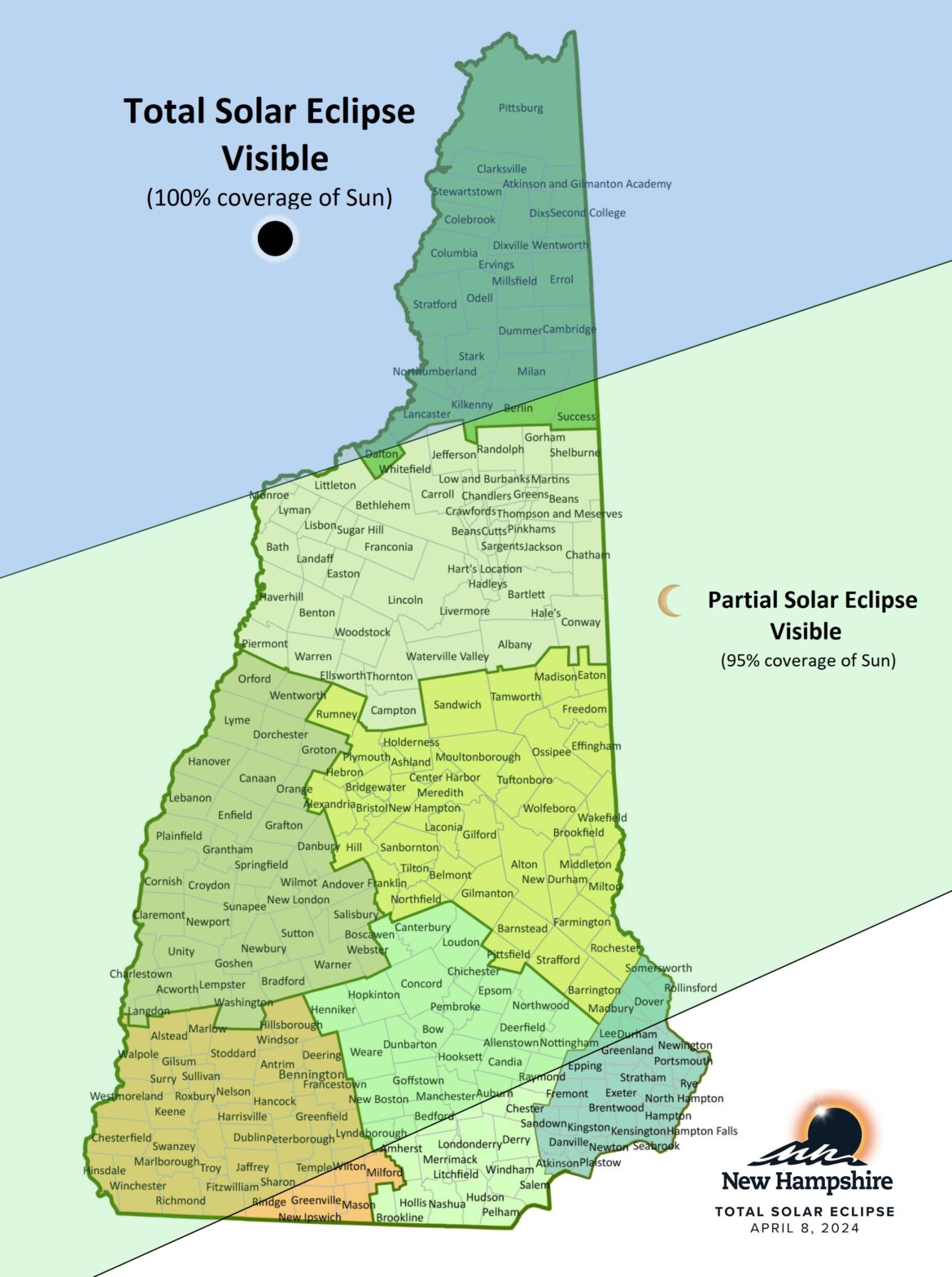Joint Information Center Activated to Assist with Public Messaging, Media Requests
CONCORD – State agencies have been working diligently alongside local communities and businesses to prepare for the solar eclipse that will occur April 8.
While all of New Hampshire will experience the eclipse, the northernmost part of the state, from the area of Lancaster north to the Canadian border, will experience totality. The rest of New Hampshire will experience a partial eclipse at about 95% totality. Totality in the Great North Woods will last approximately 3 minutes and 30 seconds and will vary slightly from west to east as it begins and ends.
As part of the state’s planning, the Joint Information Center (JIC) will be activated starting Thursday, February 29, from 8 a.m.-4 p.m. Monday through Friday. The purpose of the JIC is to coordinate information being shared by state agencies to the public and members of the media. Members of the media should email jic@dos.nh.gov or call 603-223-6169 with any questions.
“New Hampshire is the place to be on April 8 – no other spot can eclipse the views we’ll have in the North Country!” said Governor Chris Sununu. “From making viewing glasses available to schools to working hand in hand with towns, we’re on-track for a truly stellar day.”
A list of special events and lodging packages taking place during the solar eclipse in New Hampshire can be found at NHSolarEclipse.com. Events will be regularly updated. New listings for consideration can be submitted to jic@dos.nh.gov. Residents and visitors who plan to view the eclipse in New Hampshire should be prepared to make the most of their experience:
Prepare for unpredictable weather. In New Hampshire, April may bring snow and ice or warm weather and mud, all of which could impact road conditions. Plan ahead for the weather by researching where you’re going. If you plan to be outdoors, bring proper gear and dress properly for changing weather conditions.
Arrive early, stay late. There are limited routes leading into and out of the northern part of New Hampshire. Expect delays when traveling and avoid unnecessary travel on the day of the eclipse by choosing your viewing location ahead of time. Park in designated areas. Do not plan to pull over on the side of the roadways to view the eclipse, doing so can put you at risk of getting stuck in mud or snow, and tow trucks could face major delays in getting to you. Visit NewEngland511.org for up-to-date road information.
Bring supplies. Businesses are preparing to welcome visitors, but it’s still a good idea to pack some essential supplies such as water and snacks. Be sure to have a full tank of gas, and if you have an electric vehicle, map out charging stations before you leave your home.
Practice leave no trace. Pick up after yourself and be kind and respectful to others who are here for the eclipse.
Wear proper eye protection. Safely viewing a solar eclipse requires specialized glasses to protect your eyes from the sun’s light. Glasses must meet the ISO 12312-2 international safety standard. While New Hampshire does not endorse any specific brand of solar eclipse glasses, you can find a list of manufacturers on the American Astronomical Society website.
Educate yourself and others. The New Hampshire Department of Education (NHED) has compiled a list of educational resources from numerous sources that includes activities and videos. NHED also is providing nearly 65,000 ISO-certified solar eclipse safety glasses to school districts through the state that requested them. Schools with questions regarding educational materials or safety glasses orders can contact comms@doe.nh.gov.
“This is one of the most anticipated events this year, and we’re looking forward to welcoming visitors to experience this celestial phenomenon,” said NH Travel and Tourism Director Lori Harnois. “We expect a significant influx of people, which has the potential to bring business to our tourism industry during a shoulder season. We do, however, want to remind residents and visitors alike, to plan ahead, especially if you’re preparing to travel the day of the eclipse as there are limited routes in and out of the path of totality.”
Visit NHSolarEclipse.com for more information on planning, safety and events.





